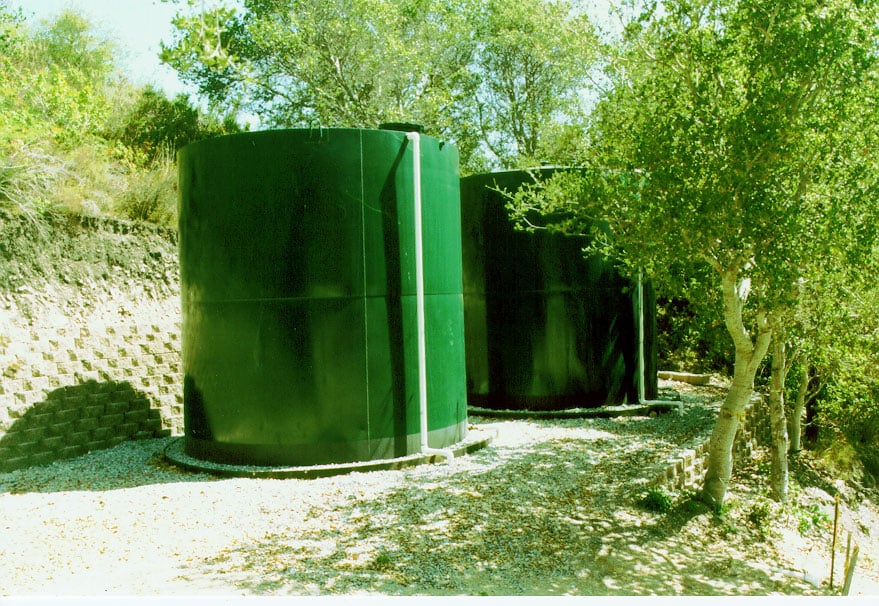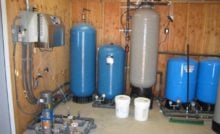Podcast Q&A 9: Can I Use Pool Chlorine Tablets to Treat My Storage Tank?


Above Ground Storage Tanks
Podcast: Play in new window | Download
Subscribe: RSS
Hello. Welcome to the Clean Water Made Easy Podcast Question and Answer Episode 9.
My name is Gerry Bulfin. I’m a WQA-Certified Master Water Specialist and Water Treatment Contractor here in Santa Cruz, California. We get a lot of phone calls, emails, and chats through our website. For this, I’m picking the more interesting ones and put up a quick answer to the question.
We received an email from Goldie, who wrote:
“My husband has been using pool tablets on a weekly basis in our 3000-gallon holding tank. Our water no longer has the faint tea color from the tannin in it. However, I can smell a strong chlorine smell in the shower and toilet. I do notice a drying effect on my skin. What I’m most concerned with is the effect on our septic tank. Is it safe to use pool chlorine tablets on a regular basis without damaging the septic system?”
Goldie, thanks for your email. The pool tablets will be effective for the tannins. They release chlorine into the water. I know you’re asking about the septic tank, but normally, we do NOT recommend pool chlorine for potable water. Even if you are not drinking the water, it’s not the best for bathing in it, either.
Pool Chlorine is for Pools, not Drinking Water
There are some pool chlorines that are also certified for drinking water, but usually, most of them are not. They are not made for drinking water, and they are made for pools.
To give you an example, you can look at the bottle or canister and see what type of chlorine it is. The common chlorine used in drinking water is solid and is calcium hypochlorite. When you put it into the water, you’re getting chlorine and a little bit of calcium, but nothing toxic. Other than the chlorine, which at certain levels is toxic, but that’s a topic for a different day. Chlorine is very effective, so they’re using it.
Anyway, calcium hypochlorite is what you want for drinking water. When you get pool chlorine, you get trichlor and the discolor type, which contain cyanuric acid. Though it sounds like cyanide, it doesn’t give you cyanide poisoning. However, there could be other contaminants in the trichlor and the discolor chlorinating compound. It’s not good for potable water.
Lithium hypochlorite is another one that’s used in pools. That’s something you would absolutely want to avoid because lithium is toxic. There are some trichlorides and dichlorides that are certified for drinking water, but I’m not sure exactly how toxic they are. Usually, we won’t recommend the pool chlorine tablets for potable water because you can get regular tablets. They’re not that expensive and they last a long time. We carry one that’s been NSF certified for drinking water, but generally, the chlorine pellets made for drinking water are the best.
You mentioned 2 things – dry skin and your septic tank.
Getting into the septic tank, we generally do not recommend a constant high chlorine residual going into your septic tank. It can slow down the bacterial growth in your septic tank and prevent it from becoming a septic tank so you don’t get that septic action. You’re better off getting the chlorine test kit and just adding a tiny bit of chlorine so you don’t have a huge residual. We generally wouldn’t want to put more than .2 or .4 parts per million chlorine residual down your septic tank. That’s what we’ve been told by septic guys. They generally want to avoid using chlorine bleach, but in the use of chlorine bleach in the laundry, we generally do it like a one-shot thing; it’s not putting that constant amount of chlorine down the septic tank. It’s not that it would completely ruin your septic tank, but it would stop it from doing what it’s supposed to do, which is to digest the sewage. So you want to avoid that.
There is a way to usually deal with that, which is to inexpensively get a small tank of carbon, and as the water flows into the house, it flows into the carbon filter, removes the sediment, takes off chlorine, and then once a week backwashes and cleans itself. Or you can get just the carbon cartridge, which is not the best thing for the whole home. You don’t get as high a flow through it, but you can use that. Or one of these small carbon filter tanks.
This would also have a big effect on the drying of the skin. Chlorine dries out your skin and hair. So the idea is that if you put a carbon filter for your home, your whole house, you’re going to remove the chlorine. Also, if there’s any tannin left in the water, the carbon would help with that. But if this is working for you, it’s definitely the lowest-cost way to go because you don’t have to buy equipment.
Generally, we recommend getting a small chlorinator if you can do it. When your well pump turns on and fills the storage tank, it pumps a tiny bit of sodium hypochlorite or calcium hypochlorite mixed with water. Either way, you have NSF-certified potable water-grade chlorine at just the right amount so you can regulate and not get a huge residual.
When you’re dosing your tank, you say you’ve been using pool tablets weekly, so I gather from that that you might be just throwing the tablets into the tank.
Throwing it into the tank, you can get a high chlorine residual and then no chlorine residual. That’s another thing. Having an automatic chlorinator is better, but people do what you’re doing. It works great but just be a little careful about using the pool chlorine. Look on the bottle and see what kind of chlorine it is. If it says lithium I would avoid it. If it’s one of the trichlor or dischlor, they’re not for potable water, but some of them had been certified for it, and they claim that the cyanuric acid part of it is not toxic. Generally, in the role of water treatment, we recommend potable water grade.
Okay. That was a really great question. Thanks for asking that. If you have a question, please go to our website, cleanwaterstore.com. You can see a little chat box there. You can chat with us, or better yet, give us a call or send us an email. Email me directly at gerrybulfin@cleanwaterstore.com. Thank you.
Recent Posts
Water Quality for Horses and Livestock: A Guide to Healthier Barns and Pastures
Clean water is the cornerstone of animal health and productivity. Whether you're raising horses, cattle,…
Clean Drinking Water for Cats: What Every Cat Owner Should Know
Why Clean Drinking Water Matters for Cats Hydration is critical to a cat’s overall health,…
Pet Hydration: What to Know About Water Safety
Clean Drinking Water for Dogs: What Every Dog Owner Should Know Clean drinking water is…
How to Ensure Fresh, Safe Water for Your Birds: Daily Care Tips for Bird Owners
Why Filtered Water for Birds Is Essential for Their Health Like food, clean drinking water…
U.S. Water Problems by Region: Common Contaminants & Solutions
Curious about U.S. water problems by region? Water quality isn’t just a national issue—it’s a…
Wildfire Water Contamination: How to Ensure Safe Water After a Fire
Wildfire Water Contamination: What You Need to Know After the Fires Drinking water contamination is…


